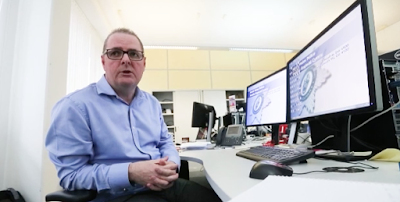Today, I share my enlightening interview with Chris Walsh, Detective Constable Cybercrime Unit at the North Wales Constabulary, who kindly donated his time to answer some burning questions I had on Cybercrime and how it’s depicted in the pages of crime fiction. I learned a thing or two, I hope you will too.
Thanks for agreeing to be on the other end of the interrogation process, Chris. Can you give me a quick overview of your work?
As Detective Constable Cybercrime Unit, my role involves the investigation of cyber dependant crimes that occur within North Wales. These typically include offences such as Hacking, Denial of Service, Ransomware investigations, Online Blackmail. I also provide training to staff in respect of Open Source investigation skills, and as a forensic examiner, I also conduct the technical element of any Cybercrime offence that the department deals with on behalf of my colleagues.
What led you the cyber-crime field?
My background has been traditional Criminal Investigation at local, force and regional level including covert policing, however, I have also worked within the force Hi-Tech Crime Unit as a forensic examiner and therefore have a combination of skills that suit Cybercrime, which is the knowledge of an investigator with the additional technical skill set.
We see dramatic depictions of cyber-tracking criminals, but is it mostly long hours spent looking at a computer screen?
Anyone who owns a mobile device such as a phone is carrying a tracking device, so that is often the easiest way to track an individual. Also, the applications on a device can also be used to identify an individual’s location at a given time, however obtaining that data can often be a challenge as we are reliant on third parties such as social media companies who do not need to comply with UK legislation as they are often based outside the UK. So yes, time is spent at a computer screen, but usually either applying for or reviewing communication data, but considerable time is also spent trying to prove the criminal offence was committed by that individual.
How do criminals attempt cover their digital footprints?
There are a multitude of applications and devices available on the open market which will allow an individual to either mask their true physical location or leave no trace of their criminal activity on a device if used correctly. Access to these applications is also often free as it is open source, however, a degree of knowledge is required to configure and use those applications correctly, which is often the downfall of many. It would be inappropriate of me to provide any specific information on current criminal methodology that is not in the public domain.
Where do you see the most troubling developments in cyber-crime?
Encryption and the reliance of individuals and organisations on technology which is either poorly configured or open to abuse.
What makes for a successful cyber-crime investigation?
Early contact and intervention which enables critical data to be obtained, and a thorough investigation by trained and knowledgeable investigators.
How do you keep one step ahead of the cyber criminals?
I don’t know about keeping ahead of them, but I personally try to keep pace by reading numerous blogs, websites, forums etc to keep current of trends and methods used by cyber criminals, and where appropriate I attend training courses that equip me with specific technical skills.
For crime writers, there’s a lot to get wrong about the work of cyber-crime detectives, what’s the biggest thing we writers get wrong?
In fairness, writers tend to be far more accurate that directors! Watching films and programmes where an investigator copies the contents of a computer to a USB stick in about 30 seconds always makes me laugh nearly as much as a typical TV surveillance follow involving one car directly behind the target vehicle. I think the difficulty for a writer is to convey what can be technical acts done by a criminal in a way that a typical reader can understand.
In these days of globalization, cross-border cyber-crimes must be hard to track. How do you work with your international counterparts?
This depends to a degree on the seriousness of the offence. There is a huge difference between someone selling stolen property in a Facebook buy/sell group, which may require data from Facebook to further the investigation, and an organised crime group in Russia, for example, writing malware that affects thousands of computers. There are information sharing agreements in place between certain parties at various national/international levels, however, these can often be time-consuming to undertake.
Any advice for crime writers out there looking to weave in a cyber-crime story into their next book?
I’ve got plenty, we just need to work out my commission rates J
Thank you, Chris. The check is in the post :-)






Comments
Post a Comment